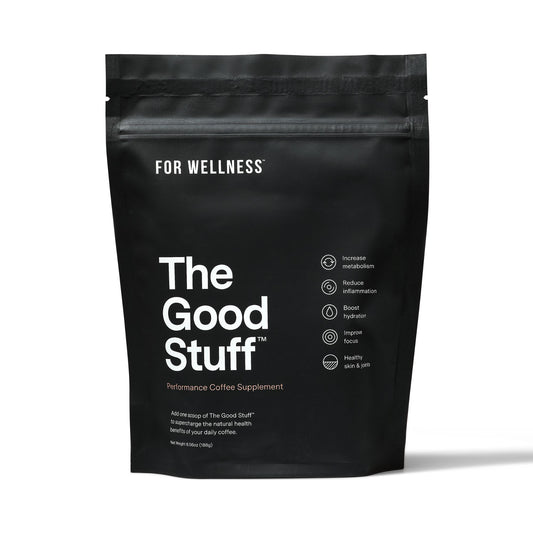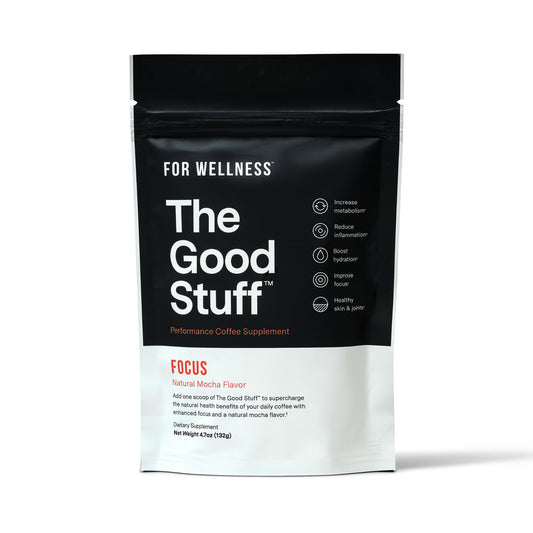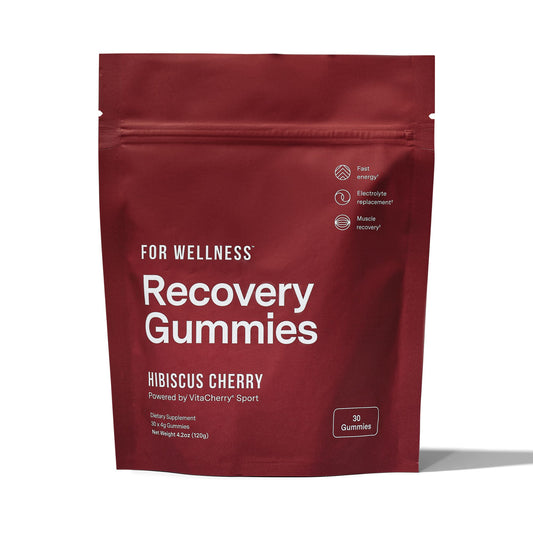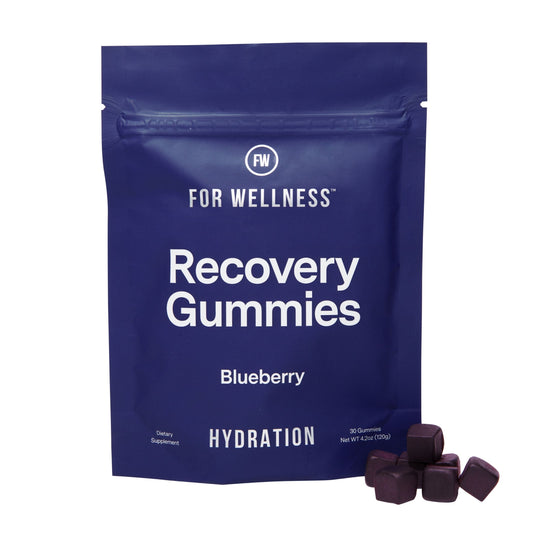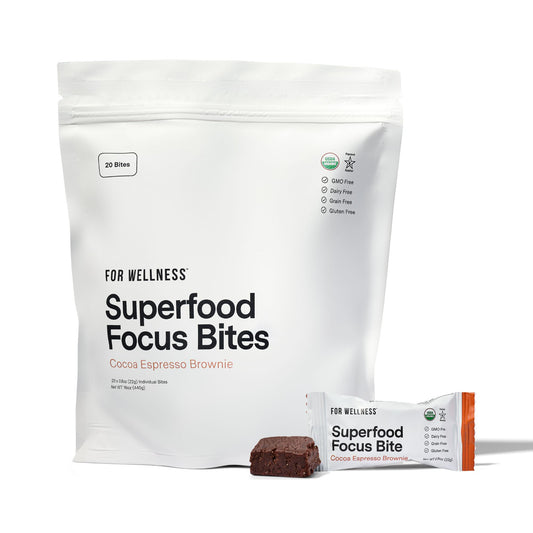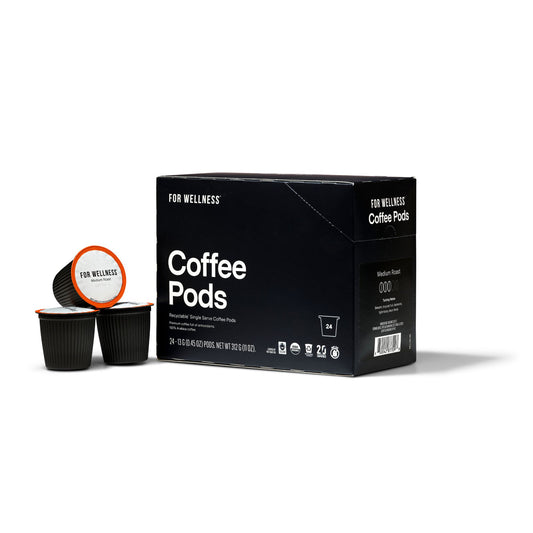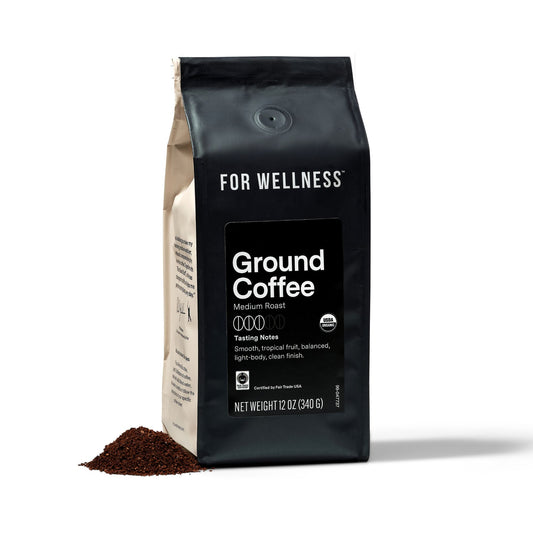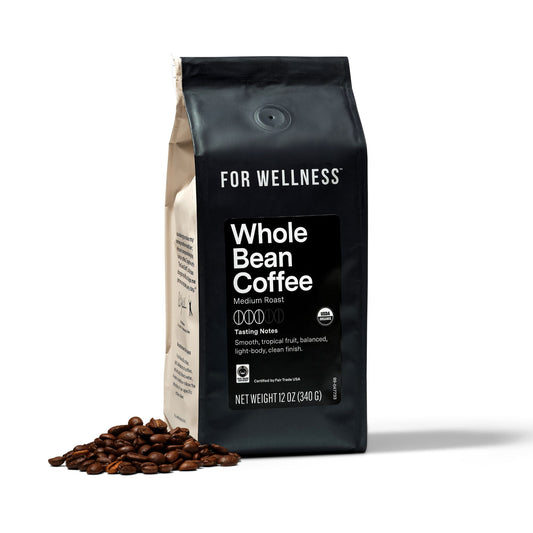Unlike many other sectors of the agricultural industry, most of the coffee we drink comes from smaller farms, as opposed to larger commercial operations.
In fact, it's estimated that 80% of the world's coffee comes from up to 25 million farming households.
While it's great to support small businesses, global coffee production is concentrated in countries with relatively low-income levels, leaving farmers vulnerable to forces such as poor harvests, natural disasters, and fluctuating coffee prices - and boy, do they fluctuate.
In 2001, coffee prices dropped to $0.43 per pound and hit almost $3 per pound in 2011.
To ensure our farmers receive fair compensation for their work and can continue operating even in times of difficulty, For Wellness coffee is Fair Trade USA Certified.
This means that, among other bonuses, coffee producers are getting a fair deal for their work and they're farming under safe and sustainable conditions.
The Fair Trade label is especially important to our co-founder, Dave Phillips.
Having traveled to the far reaches of the globe, often through unstable or hyper-remote regions to visit coffee farms, he has first-hand experience of how crucial coffee is to the livelihoods of farmers and their families.
Getting The Fair Trade Tick Of Approval
Becoming Fair Trade Certified is much more complex than signing a few pieces of paper and handing over some cash.
To be Fair Trade Certified, our coffee needs to meet stringent standards and criteria laid out by Fair Trade USA to lift up the world's coffee-producing communities.
This means complete traceability and transparency from bean to cup - no cutting corners.
Each Fair Trade assessment covers four key areas: sustainable livelihoods, community development funds, safe working conditions, and environmental protection.
Sure, it all sounds good. But what does that translate to in the real world?
Sustainable Livelihoods
For starters, Fair Trade USA mandates that Fair Trade Certified producers are paying legal minimum wages and that all workers receive salaries and wages that are in line with, or exceed legally mandated minimum wages. Strict auditing and certification processes are in place to make sure this happens.
In addition, Fair Trade Certified coffee producers pay a minimum price per pound of green coffee to the coffee producers. This minimum price is a safety net for farmers, helping them cover production costs even when global market prices fall below this level. Fair Trade USA periodically reviews the minimum price to reflect changing market conditions.
Coffee producers have earned more than $200 million through the sale of Fair Trade Certified coffee since Fair Trade USA was founded in 1998.
Community Development Funds
On top of the minimum price, coffee companies are required to pay a Fair Trade premium that's typically paid directly to a local coffee producer organization to support community development projects chosen by the farmers and farming communities.
Some examples of projects that the Fair Trade premium has funded include:
Emergency Funds: COVID-19 relief, disaster relief
Water: deep water pumps granting access to clean, safe drinking water
Environment: regenerative and reforestation efforts
Health: health clinics, sanitary facilities, septic systems, food cards
Education: building and improving schools, scholarships, school supplies
Childcare: childcare facilities, community centers
Improving Business Operations and Outputs: technologic advances, job training, safety gear
Housing: build and improve worker housing
Other: libraries, laptops, washing machines
Safe Working Conditions
Of course, there's no point in having a pricing agreement and community development if coffee farmers are risking their lives working extreme hours or being exposed to toxic pesticides.
A Fair Trade cup of coffee comes from a farm that follows fair labor practices, including the prohibition of forced/child labor, safe working conditions through adequate first aid supplies, appropriate maintenance of machinery and equipment, and reasonable accommodations for any work that poses a risk to an employee's health.
Although it's not a direct requirement of Fair Trade USA, you'll also find the coffee at For Wellness is 'farmer friendly,' meaning our growers harvest their crops without exposure to fungicides or other chemicals that could lead to long-term health issues.
Environmental Sustainability
Fair Trade USA requires that coffee companies encourage and support environmentally sustainable farming practices.
This means preventing or reducing risk to local environments through legal compliance and management systems.
These systems can look like proper disposal of waste, hazardous materials, and wastewater, as well as incentivizing producers to meet local environmental laws.
While organic certification is not mandatory, Fair Trade USA promotes using organic and sustainable farming methods to minimize the environmental impact of coffee production.
Plus, For Wellness coffee is grown free of pesticides and artificial fertilizers, exclusively using natural processes and materials.
Labeling and Promotion
Certified Fair Trade coffee products must display the Fair Trade Certified logo, making it easier to identify and support Fair Trade products.
Why Would You Shop Anything Else?
Effectively, Fair Trade lets your dollars do more than buy a cup of coffee.
With every cup of a For Wellness brew, think about all the incredible projects you're supporting, the communities you're uplifting, and (of course) the delicious, healthy brew you're enjoying.
Image credit: Fair Trade USA


